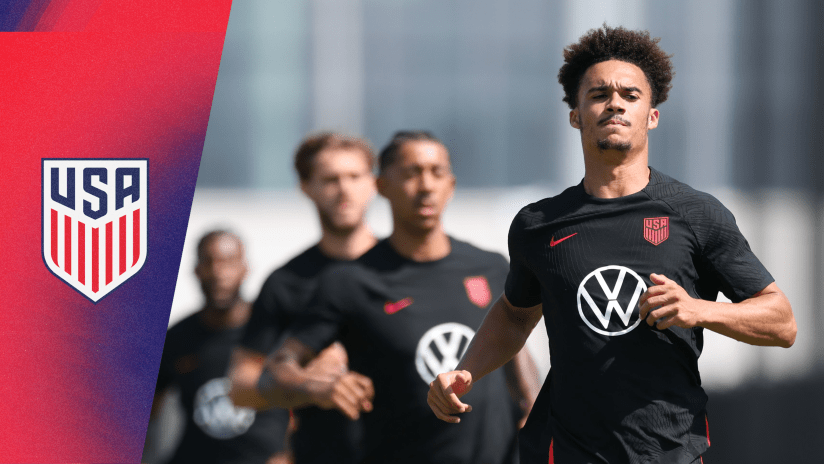How will Gregg Berhalter ensure his second World Cup cycle in charge of the US men’s national team is an improvement on his first?
While it will take months, possibly years, to really answer that question, the USMNT’s head coach did throw one modest curveball the day before his first game back in charge, Saturday’s friendly vs. Uzbekistan at CITYPARK (5:30 pm ET | TNT, Telemundo, Universo & Peackock) in St. Louis: He publicly named his starting XI more than 24 hours in advance.
"Picking up where we left off"
On the one hand, it suggested that the coach is, for now at least, keeping faith in the 4-3-3 formation with twin No. 8s ahead of a single defensive midfielder that was the Yanks’ default for most of his tenure. Depending on whether Luca de la Torre can work through a calf issue to the degree necessary to get the nod at holding midfielder, or must be replaced by FC Dallas alum Tanner Tessmann, the lineup could include as many as six ex-MLSers or products of MLS academies.
On the other, Berhalter’s announcement was a welcome jolt of transparency, albeit one unlikely to be repeated in the competitive matches that lie ahead, and perhaps a sign of learned experiences being put to use.
“Overall, for us, it's just how do we keep moving forward and not being happy with where we were?” said the former Columbus Crew boss, who noted that he expects “a difficult game” from an Uzbek side with some counterattacking weapons. “It's literally in everything, every aspect, it's evolving.
"… If you look at the top teams in the world, they always evolve throughout the years and we want to be in the state of evolving because we know it's going to lead to improvement, whether that's set pieces, whether that's mid-block defending, the consistency in a mid-block [so] that we don't have to high press all game. There's a number of different things that we're starting to talk about.”
Berhalter was separated from the program for the first eight months of the year, an odd limbo imposed by the expiration of his previous contract at the end of 2022 amid the firestorm around his clash with Gio Reyna and his parents over the Borussia Dortmund star’s playing time at the World Cup, and U.S. Soccer’s subsequent investigations.
Since his rehiring over the summer, both players and coaches have reported that the collegial team culture Berhalter helped build was sustained under the interim management stints of assistant coaches Anthony Hudson and B.J. Callaghan.
“There's no one person who's bigger than the program. There's no one person who’s bigger than the team. And [Berhalter] touched upon that whenever he came back,” midfield linchpin Weston McKennie said on Thursday. “He said look, it was amazing to be able to see that even though I was gone and whoever stepped in, to realize that the brotherhood was strong, to realize that you guys have the same values, have the same approach to the game with just the intensity, the way that we fight, the way that we want to win games.
“Honestly, it's just picking up where we left off in terms of whenever, I guess, he got let go or got sacked, I don't know how to really say it. But yeah, we kind of picked up where we left off in training, and vibes and everything is good as usual.”
Path to 2026
As they chart a course to a groundbreaking performance at the 2026 World Cup on home soil – and Berhalter has already declared the goal to be an unprecedented tournament run, to the semifinals or thereabouts – he and his staff will have to find a balance between trusting what works and avoiding stagnation.
“Right now there's just a new level of energy with everybody, on the staff, in the whole organization,” Callaghan told reporters at the start of the week; his sharing of media duties with Berhalter is another notable early sign of change.
“We know the opportunity that we have coming up here over the next couple of years. So for us it's just about continuing to get better, continuing to grow, continuing to get more players opportunities and continuing to challenge ourselves against different opponents… We have a real clear idea on where we want to go and that drives all of us each and every day.”
The coaching staff knows that inevitably, many of the factors that will influence the USMNT’s prospects are out of their direct control, starting with the fortunes of their players at club level. There’s a sense of hope that the summer transfer moves made by key figures like Christian Pulisic, Folarin Balogun and Brenden Aaronson are good news on that front.
“One thing we talked about with the group was the amount of growth the individuals have made over the last three years or last four years,” said Berhalter. “To think about Christian when we, when I first met him in Dortmund in 2018 to Christian now, is night and day. And that goes for a lot of the players. And we talked about, one of the challenges for the group is going to be, can they have that same level of progress in these next three years that they've had in the last four years?
“Joe Scally was playing for NYCFC’s youth team four years ago and now he's a consistent member of the national team. You look at Sergiño Dest, where he was. And by and large, every one of the players made huge, huge strides in these last four years. And that's what we need to be focused on these next three years if we want to reach our goals.”













